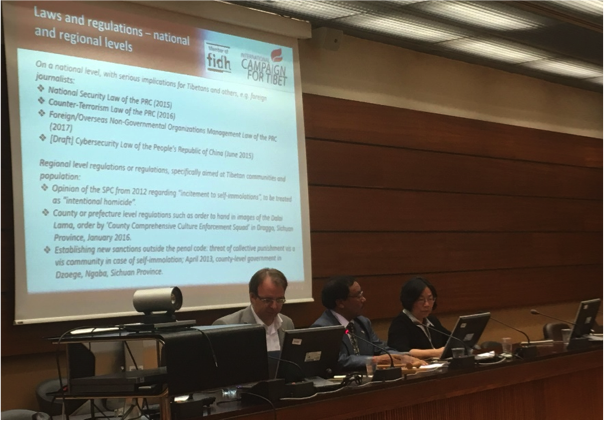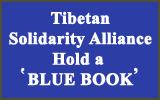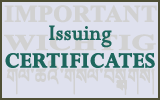Side Event on Human Rights in China and Tibet Held at Geneva

Mrs Tienchi Martin, President of Independent Chinese PEN Center from Germany, Mr Kai Müller of ICT, Berlin and Representative Ngodup Dorje at the side event on human rights in China coordinated by Tibet Bureau and International Campaign for Tibet, Berlin on 20 June 2016.
Geneva, 20 June, 2016: The 32nd session of the UN Human Rights Council has begun from 13th June 2016 with opening remarks from the President of the HR Council Ambassador CHOI Kyonglim followed by statement of the UN High Commissioner for Human Rights Mr Zeid Ra’ad Al Hussein who spoke about China’s worsening human rights situation by detaining and interrogation of lawyers in connection with their work, as well as harassment and intimidation of Government critics and NGO workers. He expressed concern about legislation on NGOs which is due to come into effect next January will further shrink the space available for civil society.
Coinciding with the ongoing HRC session’s second week on Monday 20th June at 15:00 hrs, Society for Threatened Peoples sponsored a side event on Human Rights in China being coordinated by the Tibet Bureau in Geneva and International Campaign for Tibet, Berlin.
“We invited two panelists; Mrs Tienchi Martin, President of Independent Chinese PEN Center from Germany and Mr Kai Müller of ICT, Berlin. This event was moderated by Mr Ngodup Dorjee, Representative of His Holiness the Dalai Lama,” said Mr Dawa Tsultrim, Secretary of the Tibet Bureau.
Mrs Tienchi Martin spoke about the human rights situation inside China particularly in the minority areas including Tibet. She raised the cases of Chinese freelance writers Zhao Changqing, Zhang Baocheng, poet Liang Taipinghuman and rights lawyers who were sentenced and detained in recent years including the house arrest of Nobel Laureate Liu Xiaobo’s wife. She spoke about violation of freedom of religion in Tibet by controlling and interfering in religious practices and demolishing religious property. She says that in 2012, Chen Quanguo, Party Secretary for TAR announce the launch of legal education campaign that was aimed at teaching monks and nuns about their legal obligations under the government in order to build harmonious monasteries.
She also talked about the forced disappearance of 11th Panchen Lama since 1995 and the arrest and death in prison of Tenzin Delek Rinpoche.
She urged the Chinese authority for the unconditional release of religious and political prisoners and to resume dialogue with His Holiness the Dalai Lama’s representatives. The EU should set up liaison office in Lhasa and have constant observer there to safeguard the religious freedom and human rights in Tibet. She called on Special Rapporteur to conduct an official visit to China and Tibet. She expressed need of ratification of ICCPR and guarantee the freedom of religion, speech, assembly etc.
Mr Kai Müller presented his statement on China’s security architecture in Tibet and beyond with opening remarks “The Chinese state has implemented a set of policies in Tibet that consist of repressive laws and regulations, as well as of concrete measures on the ground, such as the display of force, sending of CCP cadres to Tibetan towns across the TAR and beyond. This “Security architecture” must be of concern for the international community, as it creates neither peace nor “stability” in Tibet”. He focused on Article 90 of the counter-terror law passed by the CCP which says; where news media and other units create or disseminate false information on terrorist incidents, report or transmit details on the implementation of terrorist activities that might lead to their imitation, release gruesome or inhumane scenes from terrorist incidents, or, without permission, report or transmit the identity information of on-scene response personnel or hostages and response activity, the public security organs give a fine of up to 200,000 yuan, detain directly responsible managers and other directly responsible personnel between 5-15 days, and may give concurrent fines of up to 50,000 yuan.
Where individuals exhibit the conduct in the preceding paragraph, the public security organs will impose 10 to 15 days detention, and may give a concurrent fine of up to 10,000 yuan.
He urged the Chinese government must bring laws, regulations and measures into conformity with international human rights standards, in particular with freedom of religion and belief and freedom of expression, association and assembly. The Chinese government must amend its policies in Tibet, and thereby striving for real “stability”.
The event has been participated by several permanent missions, NGOs and other interested individual including permanent mission of China.
– Report filed by Tibet Bureau, Geneva –





